Einleitung
Irgendwann ist das optische Laufwerk doch am Ende seiner Lebenszeit anbgeangt. Diese Anleitung zeigt dir, wie du es austauschen kannst.
Werkzeuge
-
-
Lege den iMac mit der Vorderseite nach unten auf einen Tisch, so dass die Unterkante zu dir zeigt.
-
Löse die einzelne Kreuzschlitzschraube in der Mitte der Abdeckung.
-
Entferne die Abdeckung vom iMac.
-
-
-
Entferne folgende zwölf Torx Schrauben, welche die Frontblende am Rückgehäuse befestigen:
-
Acht 13 mm T8 Schrauben
-
Vier 25 mm T8 Schrauben
-
-
-
Hebe die Frontblende vorsichtig vom oberen Rand her aus dem Gehäuse.
-
Wenn der obere Rand frei ist, kannst du die Frontblende zum Fuß hin kippen und aus dem Gehäuse heben.
-
Drehe die Frobtblende weg vom restlichen Gerät und lege sie über die Oberkante des iMac.
-
-
-
Entferne die beiden 5,3 mm Torx T6 Schrauben vom LCD Stecker.
-
Greife fest die Zuglasche oben am Stecker und ziehe ihn gerade aus seinem Anschluss.
-
-
-
Fasse die Unterkante des Displays an beiden Seiten mit den Händen an und hebe es soweit hoch, das du an die Stecker gelangst.
-
Halte das Display mit einer Hand hoch; lokalisiere und löse das Kabel des Display-Thermosensors aus seinem Stecker.
-
-
-
Halte das Display weiter hoch und drücke den Stecker des Stromversorgungskabels fest mit zwei Fingern nach unten aus seinem Sockel.
-
-
-
Löse das Klebeband ab, welches das optische Laufwerk festhält.
-
Entferne die beiden 7,1 mm Torx T10 Schrauben.
-
-
-
Fasse den Stecker des optischen Laufwerks fest an und ziehe ihn gerade vom optischen Laufwerk ab.
-
Entferne das optische Laufwerk vom Gerät.
-
-
-
Um den Thermosensor des optischen Laufwerks zu entfernen, musst du erst den mittleren Finger der Halterung am Thermosensor mit der Spudgerspitze hochheben und dann das Kabel zu ihm etwas anspannen.
-
-
-
Hebele die Halterung des Thermosensors vom optischen Laufwerk mit dem flachen Ende des Spudgers aus der Klebeverbindung zum optischen Laufwerk.
-
-
-
Entferne mit einem Spudger das kleine Stückchen EMI Schaumstoff unten am optischen Laufwerk.
-
-
-
Entferne die beiden Torx T10 Schrauben auf jeder Seite des optischen Laufwerks, also insgesamt vier.
-
-
-
Drücke die Halterasten des optischen Laufwerks mit der Spudgerspitze aus ihren Löchern unten am Laufwerk.
-
-
-
Drehe die Halterung des optischen Laufwerks etwas weg vom optischen Laufwerk.
-
Ziehe die Halterung des optischen Laufwerks vom offenen Ende des optischen Laufwerks weg, achte darauf, dass sich keine Laschen verfangen.
-
Um dein Gerät wieder zusammenzusetzen, folge den Schritten in umgekehrter Reihenfolge.
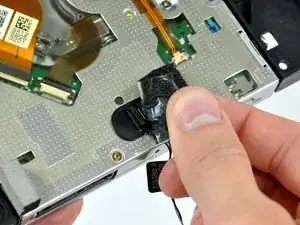
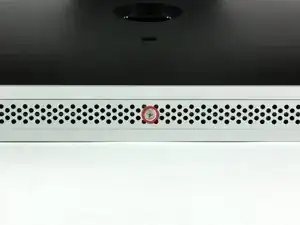
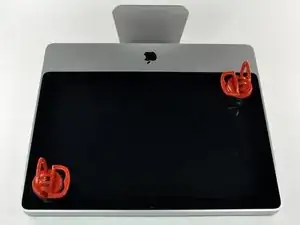
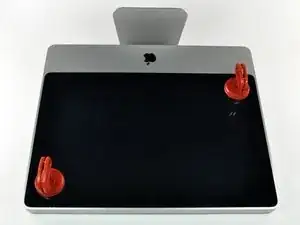
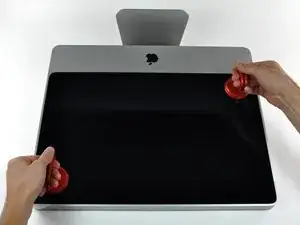
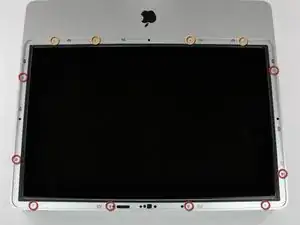
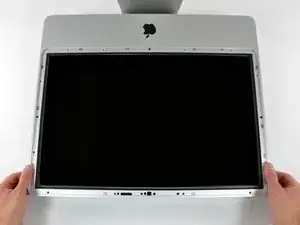
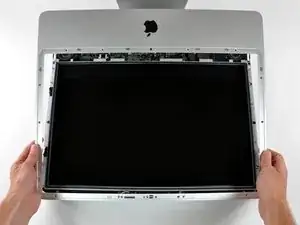
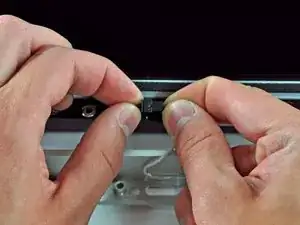
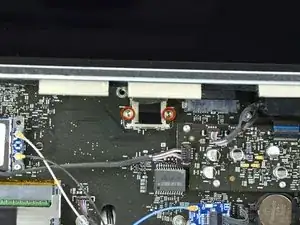
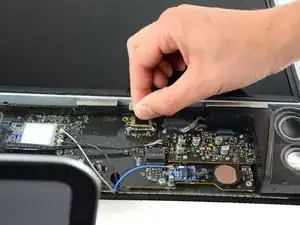
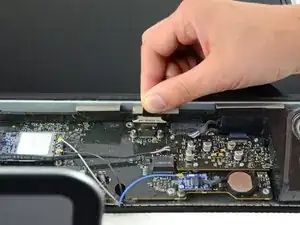
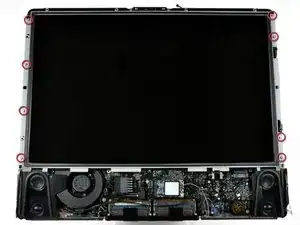
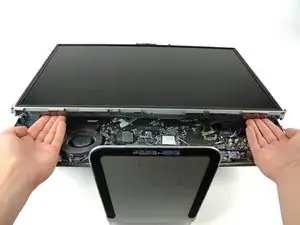
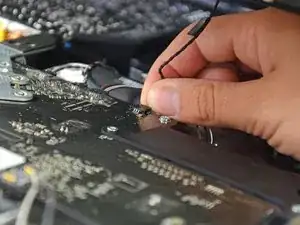
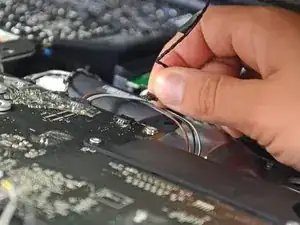
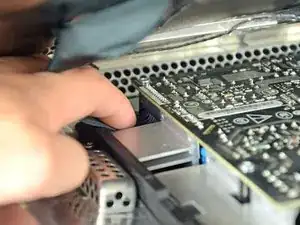
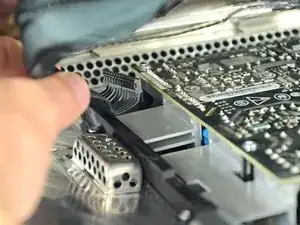
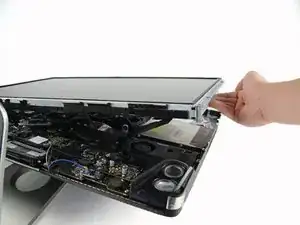
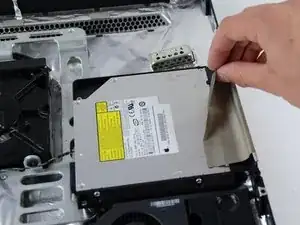
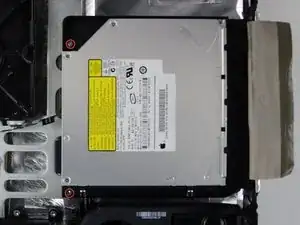
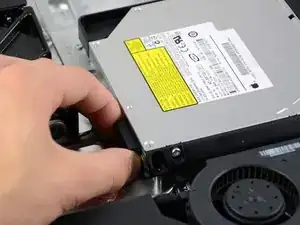
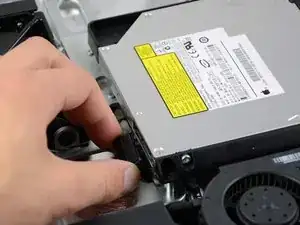
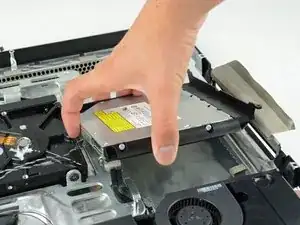
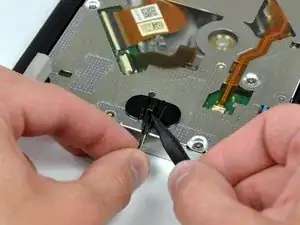
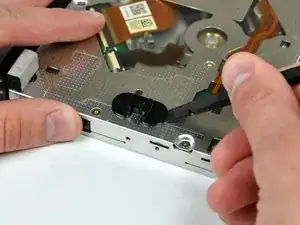
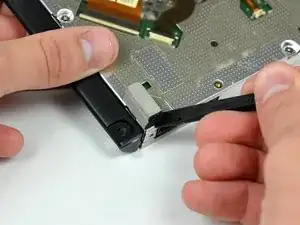
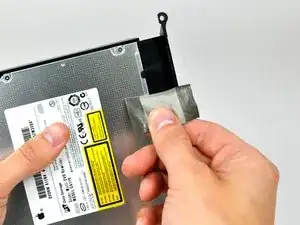
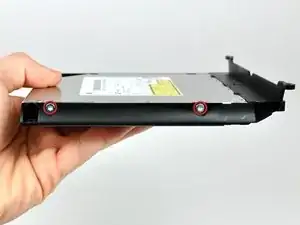
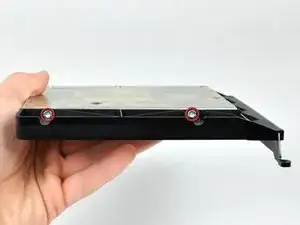
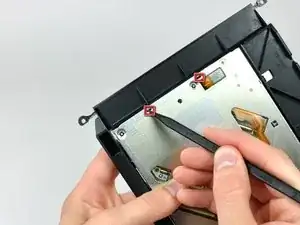
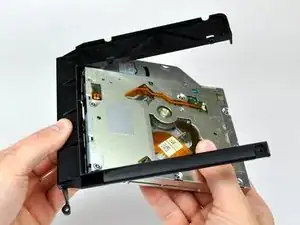
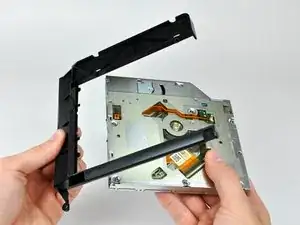

The grid won't fall off by itself. You'll have to help it. Use the smallest screwdriver you have; the Torx 6 worked fine for me. It should enter in one of the many holes composing the grid. Use it as a lever to ploy the grid a little bit. You may catch it with your fingers and that's it.
Be carefull not to damage the hole by a too strong leverage.
Laurent -
much more safer to use duct tape, instead of torx 6. (glue it along the length of the grid and pull). it will loose instantly and smooth;)
Hofmann78rus -
Anyone know a guide to replace the plastic piece this screw connects to? I accidentally forgot this step - went to remove the front bezel and bent the plastic piece the access door connects to.
Jason Augustin -